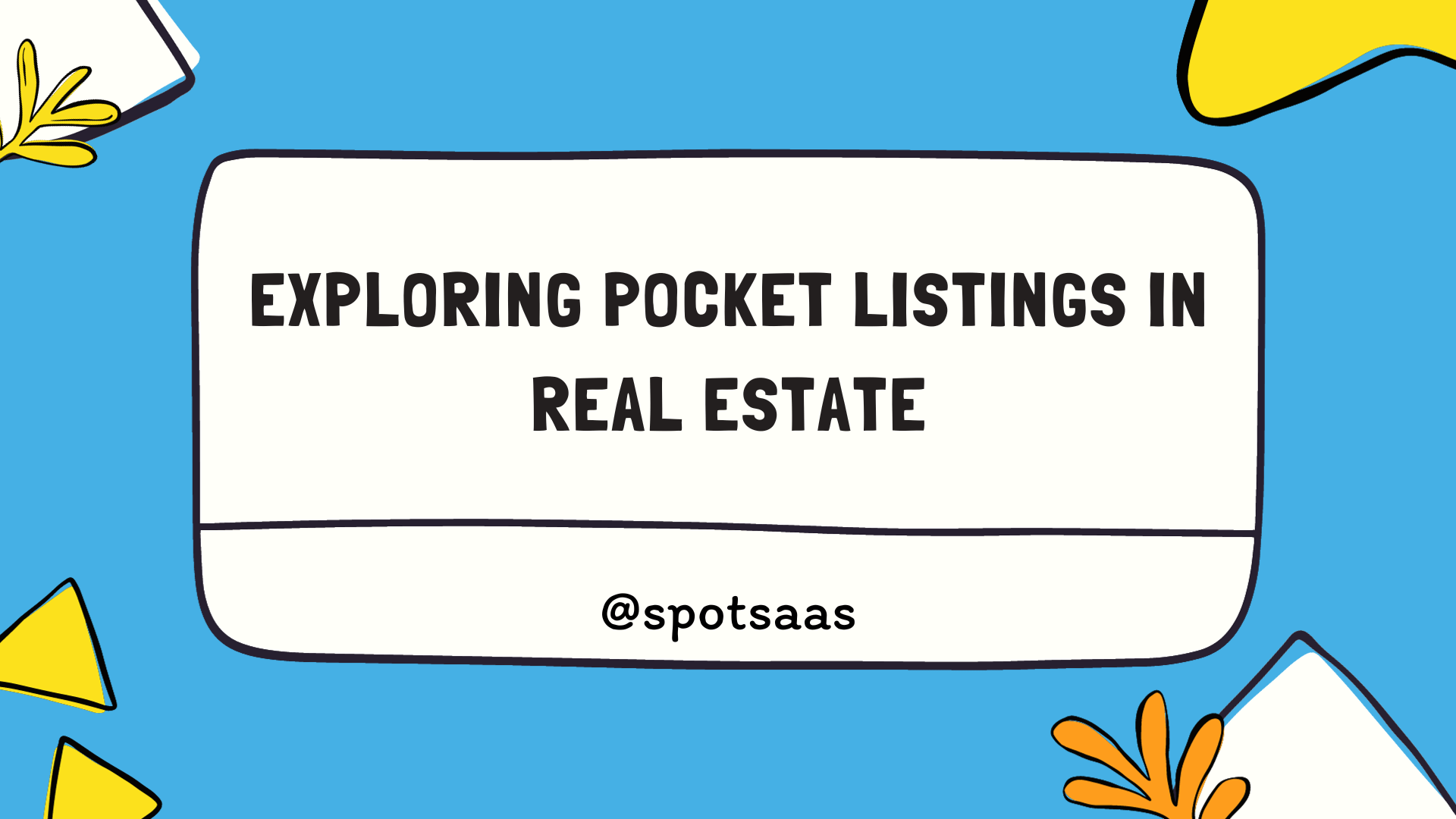If you’ve stumbled upon the term “pocket listings” and felt your eyebrows furrow in confusion, trust me, you are not alone.
In this comprehensive guide, we’ll venture together through what pocket listings truly stand for, their inner workings, their strengths and weaknesses and some handy doses of wisdom to help you steer through them successfully.
Key Takeaways
- Pocket listings are off-market real estate listings that are not publicly advertised on traditional listing platforms like the MLS.
- These private listings provide an alternative route for homeowners who want to sell their property discreetly without drawing attention from the general public.
- Pocket listings differ from traditional listings in that they are not widely marketed and do not benefit from wide publicity through online platforms and open houses.
- Real estate agents play a crucial role in pocket listings by working closely with sellers to privately market their off-market properties.
Understanding Pocket Listings
Pocket listings are off-market real estate listings that are not publicly advertised on traditional listing platforms such as the MLS.
Definition of pocket listings
Pocket listings have a unique place in the real estate world. They are property listings that remain private, not appearing on the Multiple Listing Service (MLS), which is widely used to market homes.
Also known as off-market or exclusive listings, these listings provide an alternative route for homeowners who want to sell their property discreetly without drawing attention from the general public.
Rather than being publicly listed and advertised, these properties are quietly marketed through private networks. The decision to use a this type of listing can often come down to factors such as maintaining privacy or exclusivity during the selling process.
However, it’s important to note that since they’re not typically shared with other brokers, some consider them controversial due to potential limitations on transparency within the housing market.
Differences from traditional listings
Pocket listings take a departure from traditional ways of selling properties. In the conventional method, homes for sale are listed on the Multiple Listing Service (MLS), where they get maximum exposure to potential buyers and real estate agents.
However, these listings aren’t made public in this broad manner. The information remains with one agent or broker who can share it within a limited circle.
These unadvertised listings also differ in their marketing approach. Standard property listings benefit from wide publicity through online platforms and open houses. In contrast, pocket sales are hushed affairs; there are no grand display methods involved here! This lowkey listing strategy is useful when homeowners want to gauge the market or maintain privacy during the transaction process.
How Pocket Listings Work
Real estate agents play a crucial role in posting these listings by working closely with sellers to market their off-market properties privately.
Process of off-market listings
First, let’s examine the process of off-market listings.
| Step | Description |
|---|---|
| 1 | Decisions may be due to reasons like maintaining privacy or wanting exclusivity. |
| 2 | The homeowner engages a real estate agent for private marketing of the property. |
| 3 | The agent utilizes extensive private connections as the property is not publicly open. |
| 4 | These involve limited marketing and broker collaboration. |
| 5 | The agent utilizes extensive private connections as the property is not publicly open. |
| 6 | Potential buyers are privately informed and may conduct private showings. |
| 7 | Exclusive access to off-market properties is granted to prospective purchasers. |
| 8 | Negotiations take place once an acceptable offer is presented, concluding in a closed deal. |
Thought you might want to view the list of Top Real Estate Management Software in 2023
Role of agents in pocket listings
Real estate agents play a crucial role in facilitating pocket listings. They act as intermediaries between sellers and potential buyers, using their networks to connect the right parties.
Agents with access to exclusive off-market properties can match their clients’ specific preferences and requirements with these hidden gems. Additionally, they handle negotiations and ensure that all legalities are met throughout the transaction process.
By working closely with both sellers and buyers, agents bring value by navigating the complexities of pocket listings and maximizing opportunities for successful sales or purchases.
Pros and Cons of Pocket Listing
Advantages for sellers
Selling a property through a pocket listing offers several advantages for sellers. Firstly, it allows homeowners to maintain their privacy and discretion throughout the sale process.
By keeping the listing off-market, sellers can avoid the hassle of open houses and public showings. Additionally, these listings often attract serious buyers who are willing to pay a premium for exclusive access to these properties.
This exclusivity can result in faster sales and potentially higher selling prices. Furthermore, these listings provide an opportunity for sellers to test the market without committing to a full-scale marketing campaign.
Advantages for buyers
Buyers can benefit from pocket listings in a few ways. Firstly, they have the opportunity to access exclusive properties that are not widely available on the market. This means that buyers may be able to find unique and desirable homes that other buyers might not even know about.
Secondly, these listings offer a higher level of privacy for both buyers and sellers. Buyers can explore these off-market listings without drawing attention or facing any competition from other potential buyers.
Lastly, these listings provide an advantage in terms of negotiation leverage. Since these properties are not listed publicly, there is less competition, which gives buyers more room to negotiate favourable terms and potentially secure a better deal on their home purchase.
Disadvantages for both parties
There are some disadvantages for both sellers and buyers when it comes to pocket listings. For sellers, the main disadvantage is the limited exposure their property receives. Without being listed on the MLS or other public platforms, potential buyers may not even know that the property is available.
This can result in a smaller pool of interested buyers and potentially lower offers. On the other hand, buyers face disadvantages as well. Since pocket listings are private and not widely marketed, it can be challenging for them to find these properties unless they have an established relationship with an experienced agent who has access to off-market listings.
This lack of access can limit their options and make it harder to find their ideal home.
Navigating Pocket Listings
Finding pocket listings can be challenging, but working with experienced agents and utilizing online platforms can greatly increase your chances of successfully navigating the world of off-market properties.
Finding pocket listings
I have found that finding pocket listings can be a unique challenge in the real estate market. Here are some tips to help you navigate the process:
| Step | Description |
|---|---|
| 1 | Connect with experienced agents with access to pocket listings. |
| 2 | Attend local real estate events and network with industry professionals. |
| 3 | Utilize online platforms or services specializing in pocket listings. |
| 4 | Inform your agent about your interest in off-market opportunities. |
| 5 | Stay abreast of trends in desired neighborhoods and engage in word-of-mouth exchanges. |
| 6 | Directly approach homeowners who might be considering selling privately. |
| 7 | Monitor public records for signs of potential pocket listings like property transfers or tax changes. |
Working with experienced agents
Experienced agents are essential when navigating pocket listings in the real estate market. They have a deep understanding of these off-market properties and can provide valuable insights to buyers and sellers.
These agents have access to private networks and exclusive listings, giving their clients an advantage in finding hidden opportunities. Moreover, experienced agents know how to market a pocket listing discreetly while ensuring legal compliance.
Their expertise helps both parties navigate the complexities of these non-MLS listings and increases the chances of a successful transaction.
Tips for successfully navigating pocket listings
Navigating pocket listings can be a unique experience in the real estate market. Here are some tips to help you successfully navigate pocket listings:
| Strategy | Description |
|---|---|
| Build a strong network | Connect with agents who have access to pocket listings and communicate your property preferences to them. |
| Be proactive | Actively reach out to agents and inform them about your specific property requirements and preferences. |
| Be flexible | Maintain open-mindedness and consider adjusting your preferences to capitalize on unique pocket listing opportunities. |
| Act quickly | Be ready to make offers swiftly on available pocket listings due to the high interest from serious buyers. |
| Leverage technology | Utilize online platforms specializing in off-market or exclusive listings to stay updated on available properties. |
| Maintain confidentiality | Respect the privacy preferences of sellers by keeping property details confidential. |
| Consult legal professionals | Seek guidance from legal experts for navigating contractual and legal aspects of pocket listing transactions. |
Conclusion
In conclusion, exploring pocket listings in real estate offers a unique insight into the off-market side of property transactions. Understanding how these exclusive listings work and the pros and cons they bring can be valuable for both sellers and buyers.
Navigating this hidden market requires finding experienced agents who can provide access to private networks, ultimately giving individuals an opportunity to explore properties that may not be publicly advertised.
By delving into the world of pocket listings, one can gain access to an alternative approach to buying or selling homes in a discreet and confidential manner.
Frequently Asked Questions
What are pocket listings in real estate?
Pocket listings refer to properties that are for sale but not publicly advertised on the multiple listing service (MLS) or other public platforms.
Why would a seller choose a pocket listing?
Sellers may choose a pocket listing to maintain privacy, test the market without committing to a full-scale marketing campaign, or target specific buyers.
How can I find pocket listings as a buyer?
To access pocket listings, work with an experienced real estate agent who has connections and knowledge of off-market properties in your desired area.
Are there any drawbacks to buying or selling through a pocket listing?
Drawbacks of pocket listings include limited exposure for sellers and potentially missing out on opportunities for buyers who rely solely on public property-listing resources.
Can I negotiate better deals with sellers using pocket listings?
While it’s possible to find unique opportunities through pocket listings, negotiating better deals depends on various factors such as market conditions and the motivation of the seller.




